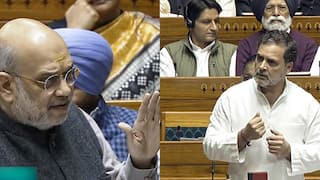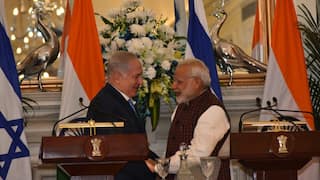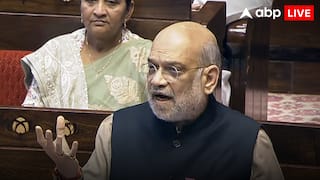Quad Lashes Out At China Again, Talks Of ‘Militarization Of Disputed Features’ In South China Sea
The Quad Foreign Ministers’ meeting that took place in Tokyo on Monday came down heavily on Chinese activities in the South and East China Seas. Beijing reacted strongly saying Quad is all about ‘scaremongering’.

Quad Foreign Ministers' Meeting: The Foreign Ministers of Quad countries – India, United States, Japan, and Australia – met in the Japanese capital of Tokyo for yet another round of talks on the next steps of the grouping even as they came down heavily on China, particularly to Beijing’s belligerent activities in the South China and East China Seas referring to “militarization of disputed features, and coercive and intimidating manoeuvres”.
The Quad Foreign Ministers’ Meeting was held in Tokyo for which External Affairs Minister S. Jaishankar visited Japan. He also met his counterparts from the US, Japan and Australia – Antony Blinken, Kamikawa Yoko, and Penny Wong, respectively on the sidelines for bilateral talks.
“Quad today is systemically embedded in our respective foreign policies… Involves democratic polities, pluralistic societies and market economies working together for a free and open Indo-Pacific, rules based order and for global good,” Jaishankar said after the meeting.
The Quad Foreign Ministers meeting, which will pave the way for the upcoming Summit-level talks between the leaders, primarily discussed China’s coercive actions in the South China Sea. The next Quad Summit is expected to be held in New Delhi, India in the latter part of the year, most probably post the US Presidential elections.
Emphasising the importance of adherence to international law under the United Nations Convention on the Law of the Sea (UNCLOS), the Quad Foreign Ministers jointly said, “We are seriously concerned about the situation in the East and South China Seas and reiterate our strong opposition to any unilateral actions that seek to change the status quo by force or coercion. We continue to express our serious concern about the militarization of disputed features, and coercive and intimidating manoeuvres in the South China Sea.”
Seeking to address challenges to the global maritime rules-based order, the Quad foreign ministers also expressed concerns over the “dangerous use of coast guard and maritime militia vessels, the increasing use of various kinds of dangerous manoeuvres, and efforts to disrupt other countries’ offshore resource exploitation activities.”
The statement came in the wake of rising tensions between China and the Philippines on the regular clashes between them in the South China Sea that have given rise to substantial tensions in the region.
“We emphasize the importance of maintaining and upholding freedom of navigation and overflight, other lawful uses of sea, and unimpeded commerce consistent with international law,” the joint statement added.
ALSO READ | J&K Elections Will Take Place This Year But Statehood Unlikely Soon Amid Terror Spurt
‘Quad Is All About Scaremongering, Fuelling Confrontation’
The Quad foreign ministers’ joint statement invited the severe ire of Beijing which reacted strongly and said that the Quad is all about “scaremongering”.
“While chanting a free & open Indo-Pacific the Quad is all about scaremongering, fuelling confrontation and suppressing the success of others—the exact opposite of the peace, prosperity and cooperation embraced by the Asia-Pacific,” said Lin Jian, Spokesperson of the Chinese Foreign Ministry.
He added, “The South China Sea has seen enough military muscle flexing and scaremongering by countries outside the region, and various clubs of countries they've built to incite confrontation—they are the biggest threat and challenge to peace and stability in this region.”
Beijing also said, those countries that are outside the region should “stop fuelling tensions and respect the effort of countries inside the region for peace & stability … China opposes bloc confrontation disguised as an anti-coercion campaign and unfair rules imposed in the name of a rules-based order.”
Criticising Japan and the US particularly, Lin said, “It is Japan & the US that are pursuing their selfish agenda at the expense of other countries’ security interests & the welfare of people in the Asia-Pacific … Despite their purported commitment to regional peace & security, Japan and the US have been doing the exact opposite by ganging up on other countries, practicing group politics and inciting bloc confrontation.”
Russia-Ukraine War Led To ‘Economic Damage’, Says Jaishankar
External Affairs Minister Jaishankar also spoke about the adverse impact of the ongoing Russia-Ukraine war during a press meet in Tokyo where he mainly highlighted the “economic damage” and “economic crisis” caused by the conflict.
“From the very beginning we had the view that use of force does not resolve problems between countries. In the last two-and-a-half years, as this conflict has deepened, it has cost lives, it has done economic damage, it has had global consequences,” Jaishankar told the local media there.
He said, “If you look at parts of Asia, Africa and Latin America, it has actually impacted other societies, it has led to food shortages, it has raised energy costs, it has contributed to global inflation. In some cases it has even directly triggered economic crises in some countries.”
Reiterating Prime Minister Narendra Modi’s recent statement in Russia to their President Vladimir Putin that solution to the war cannot come from the battlefield, Jaishankar said, “There must be a return to dialogue and diplomacy.”
“More needs to be done, we cannot resign ourselves to the continuation of the current state of conflict … That would be fatalistic. I think it is important for countries who are in touch with both parties … Not many countries are talking to both Russia and Ukraine. So we do believe that we should be more active there,” Jaishankar added.
He also stressed there will be “more contacts” between India and Russia as well as India and Ukraine.
ALSO READ | US, India Shouldn’t Impede Defence Cooperation Due To Delhi’s Russia Legacy: USIBC
India, China Will ‘Find A Way’
Responding to a question on the border standoff between India and China, Jaishankar ruled out the intervention of a third party and said it is for the two countries to “find a way” bilaterally.
“We are not looking to other countries to sort out what is really an issue between India and China … "We have a problem, or, I would say, an issue between India and China...I think it is for two of us to talk it over and to find a way,” he said.
Referring to his recent meetings with Chinese Foreign Minister Wang Yi, the External Affairs Minister said, “Obviously, other countries in the world would have an interest in the matter, because we are two big countries and the state of our relationship has an impact on the rest of the world. But we are not looking to other countries to sort out what is really an issue between us.”






































